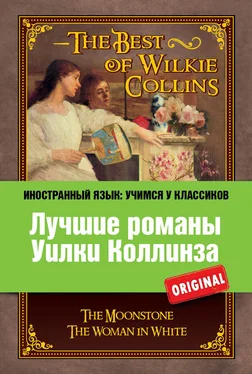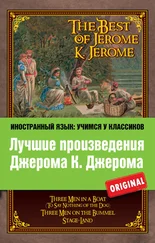“Let Lady Glyde’s maid come in, Louis. Stop! Do her shoes creak?”
I was obliged to ask the question. Creaking shoes invariably upset me for the day. I was resigned to see the Young Person, but I was NOT resigned to let the Young Person’s shoes upset me. There is a limit even to my endurance.
Louis affirmed distinctly that her shoes were to be depended upon. I waved my hand. He introduced her. Is it necessary to say that she expressed her sense of embarrassment by shutting up her mouth and breathing through her nose? To the student of female human nature in the lower orders, surely not.
Let me do the girl justice. Her shoes did NOT creak. But why do Young Persons in service all perspire at the hands? Why have they all got fat noses and hard cheeks? And why are their faces so sadly unfinished, especially about the corners of the eyelids? I am not strong enough to think deeply myself on any subject, but I appeal to professional men, who are. Why have we no variety in our breed of Young Persons?
“You have a letter for me, from Miss Halcombe? Put it down on the table, please, and don’t upset anything. How is Miss Halcombe?”
“Very well, thank you, sir.”
“And Lady Glyde?”
I received no answer. The Young Person’s face became more unfinished than ever, and I think she began to cry. I certainly saw something moist about her eyes. Tears or perspiration? Louis (whom I have just consulted) is inclined to think, tears. He is in her class of life, and he ought to know best. Let us say, tears.
Except when the refining process of Art judiciously removes from them all resemblance to Nature, I distinctly object to tears. Tears are scientifically described as a Secretion. I can understand that a secretion may be healthy or unhealthy, but I cannot see the interest of a secretion from a sentimental point of view. Perhaps my own secretions being all wrong together, I am a little prejudiced on the subject. No matter. I behaved, on this occasion, with all possible propriety and feeling. I closed my eyes and said to Louis —
“Endeavour to ascertain what she means.”
Louis endeavoured, and the Young Person endeavoured. They succeeded in confusing each other to such an extent that I am bound in common gratitude to say, they really amused me. I think I shall send for them again when I am in low spirits. I have just mentioned this idea to Louis. Strange to say, it seems to make him uncomfortable. Poor devil!
Surely I am not expected to repeat my niece’s maid’s explanation of her tears, interpreted in the English of my Swiss valet? The thing is manifestly impossible. I can give my own impressions and feelings perhaps. Will that do as well? Please say, Yes.
My idea is that she began by telling me (through Louis) that her master had dismissed her from her mistress’s service. (Observe, throughout, the strange irrelevancy of the Young Person. Was it my fault that she had lost her place?) On her dismissal, she had gone to the inn to sleep. (I don’t keep the inn – why mention it to ME?) Between six o’clock and seven Miss Halcombe had come to say good-bye, and had given her two letters, one for me, and one for a gentleman in London. (I am not a gentleman in London – hang the gentleman in London!) She had carefully put the two letters into her bosom (what have I to do with her bosom?); she had been very unhappy, when Miss Halcombe had gone away again; she had not had the heart to put bit or drop between her lips till it was near bedtime, and then, when it was close on nine o’clock, she had thought she should like a cup of tea. (Am I responsible for any of these vulgar fluctuations, which begin with unhappiness and end with tea?) Just as she was WARMING THE POT (I give the words on the authority of Louis, who says he knows what they mean, and wishes to explain, but I snub him on principle) – just as she was warming the pot the door opened, and she was STRUCK OF A HEAP (her own words again, and perfectly unintelligible this time to Louis, as well as to myself) by the appearance in the inn parlour of her ladyship the Countess. I give my niece’s maid’s description of my sister’s title with a sense of the highest relish. My poor dear sister is a tiresome woman who married a foreigner. To resume: the door opened, her ladyship the Countess appeared in the parlour, and the Young Person was struck of a heap. Most remarkable!
I must really rest a little before I can get on any farther. When I have reclined for a few minutes, with my eyes closed, and when Louis has refreshed my poor aching temples with a little eau-de-Cologne, I may be able to proceed.
Her ladyship the Countess —
No. I am able to proceed, but not to sit up. I will recline and dictate. Louis has a horrid accent, but he knows the language, and can write. How very convenient!
Her ladyship, the Countess, explained her unexpected appearance at the inn by telling Fanny that she had come to bring one or two little messages which Miss Halcombe in her hurry had forgotten. The Young Person thereupon waited anxiously to hear what the messages were, but the Countess seemed disinclined to mention them (so like my sister’s tiresome way!) until Fanny had had her tea. Her ladyship was surprisingly kind and thoughtful about it (extremely unlike my sister), and said, “I am sure, my poor girl, you must want your tea. We can let the messages wait till afterwards. Come, come, if nothing else will put you at your ease, I’ll make the tea and have a cup with you.” I think those were the words, as reported excitably, in my presence, by the Young Person. At any rate, the Countess insisted on making the tea, and carried her ridiculous ostentation of humility so far as to take one cup herself, and to insist on the girl’s taking the other. The girl drank the tea, and according to her own account, solemnised the extraordinary occasion five minutes afterwards by fainting dead away for the first time in her life. Here again I use her own words. Louis thinks they were accompanied by an increased secretion of tears. I can’t say myself. The effort of listening being quite as much as I could manage, my eyes were closed.
Where did I leave off? Ah, yes – she fainted after drinking a cup of tea with the Countess – a proceeding which might have interested me if I had been her medical man, but being nothing of the sort I felt bored by hearing of it, nothing more. When she came to herself in half an hour’s time she was on the sofa, and nobody was with her but the landlady. The Countess, finding it too late to remain any longer at the inn, had gone away as soon as the girl showed signs of recovering, and the landlady had been good enough to help her upstairs to bed.
Left by herself, she had felt in her bosom (I regret the necessity of referring to this part of the subject a second time), and had found the two letters there quite safe, but strangely crumpled. She had been giddy in the night, but had got up well enough to travel in the morning. She had put the letter addressed to that obtrusive stranger, the gentleman in London into the post, and had now delivered the other letter into my hands as she was told. This was the plain truth, and though she could not blame herself for any intentional neglect, she was sadly troubled in her mind, and sadly in want of a word of advice. At this point Louis thinks the secretions appeared again. Perhaps they did, but it is of infinitely greater importance to mention that at this point also I lost my patience, opened my eyes, and interfered.
“What is the purport of all this?” I inquired.
My niece’s irrelevant maid stared, and stood speechless.
“Endeavour to explain,” I said to my servant. “Translate me, Louis.”
Louis endeavoured and translated. In other words, he descended immediately into a bottomless pit of confusion, and the Young Person followed him down. I really don’t know when I have been so amused. I left them at the bottom of the pit as long as they diverted me. When they ceased to divert me, I exerted my intelligence, and pulled them up again.
Читать дальше
Конец ознакомительного отрывка
Купить книгу












